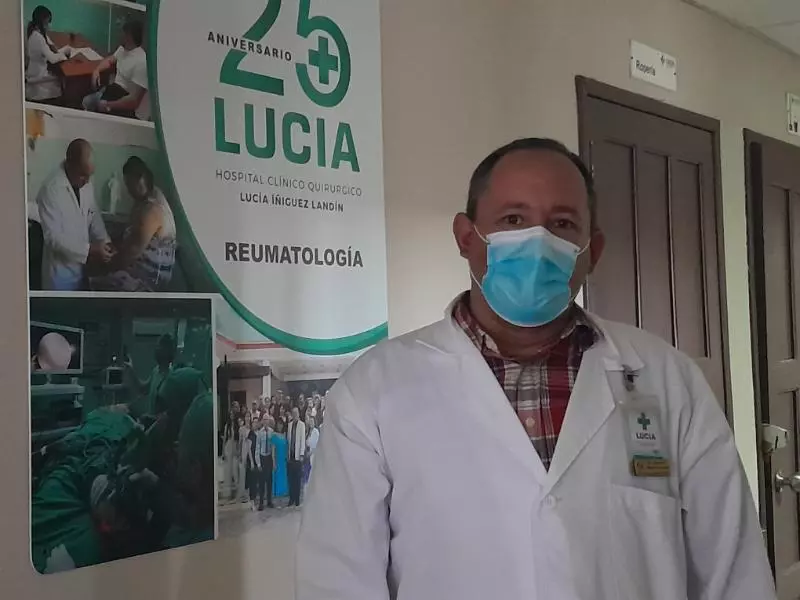Dr. Alberto Alberteris Rodríguez, as president of the Holguin Chapter of the Cuban Society of Rheumatology and head of the service for this specialty at the Lucía Íñiguez Landín Clinical and Surgical Hospital, is one of the most active professionals in the care of patients with Systemic Lupus Erythematosus (SLE) in this northeastern region.
He is a driving force in the efforts to provide a better quality of life for those affected and to make personalized therapies available for this autoimmune rheumatic disease. Every May 10th, World Day for Lupus, spaces are dedicated to dialogue, such as the one held during the IV Lupus 2025 Scientific Meeting.
What is Lupus?
“We are dealing with a chronic inflammatory autoimmune disease that causes extensive multisystem damage. Of the diseases we treat as rheumatologists, it is the one with the highest incidence and prevalence in the province; it is the prototype of an autoimmune and systemic disease.” “It presents a clinical heterogeneity that makes its treatment very difficult because we cannot have a treatment for all patients, as they do not have the same clinical characteristics.
Therefore, the treatment that is good for some may not work for others. This personalized therapy is fundamentally based on the molecular study of each individual.”
How much progress has been made in the management and care of patients with Lupus?
“Currently, progress is being made in genomics, looking for the specific alteration in each patient to find the ideal medication for the alteration present in each of them. “As an autoimmune disease, it is more prevalent in women, with nine out of every 10 affected individuals being women and one being men.
However, it is more aggressive in men and generally causes kidney and cardiopulmonary damage.
But the clinical variability is wide.”
What treatments are available in the province for patients with SLE?
“Currently, our therapeutic lines include immunosuppressive treatment, which can be conventional immunosuppressants and, in some specific cases, immunosuppressive agents.
Thanks to genetic engineering and biotechnology, we have been able to use some monoclonal antibodies used worldwide.”
Are we facing a hereditary disease? –
“It’s not a hereditary disease, but its pathogenesis suggests that it has a significant genetic component. Patients don’t inherit the disease because it’s not hereditary, but they do inherit the genetic susceptibility to suffering from it when they have that alteration in their genetic makeup and are exposed to a triggering agent, then they develop the disease.”
So, does being a chronic disease mean it has no cure? –
“So far, it’s a chronic disease with no cure, and it has the characteristic that it progresses through flares, that is, flares of the disease with remissions. What the most modern treatments do is minimize these periods of activity and achieve longer remissions; that is, we can have a patient in remission for six months, a year, or even two years.
So, medications help shorten the time of activity and increase the remission period for patients, which improves their quality of life and reduces the damage it can cause to their system.”
What care is provided to lupus patients in Holguin?
-“The Rheumatology Department has a room for admitting complicated or difficult-to-manage cases. In all health areas, there is a Rheumatology clinic, which, according to the polyclinic, has a specific day on which rheumatologists attend to treat patients. When a difficult-to-manage patient is detected or diagnosed, they are transferred to the Lucía Hospital for further study in the department.”
What diagnostic method do you base your diagnosis on to identify the disease? –
“The most important factor is the clinical picture, that is, the symptoms for which the patient comes to the clinic. In addition, laboratory studies are very important in our specialty. These are immunological studies, and for this we rely on antinuclear antibodies.”
How relevant is the development of scientific meetings of this nature? –
“During the meeting, lectures were given on personalized therapies in the field of Precision Medicine. We provided an update on everything published and what is being done worldwide in the search for the most effective way to treat patients.”
“A lecture was also given on the 2024 American College of Rheumatology guidelines for the treatment of lupus nephritis, one of the most serious conditions and one that causes the most morbidity and mortality in patients. Therefore, the guidelines are updated periodically with all the evidence and the most effective treatments so that the rheumatology community can better care for these patients with kidney damage.”
“As this event brings together several specialties, at the end, a group of residents presented clinical cases of atypical patients for discussion among faculty and residents,” he concluded. A new hope for lupus lies in advanced CART-T cell therapies, where scientists have been able to genetically modify T cells to recognize and eliminate specific immune system cells that cause damage.
This undoubtedly represents a revolution in the therapeutic paradigm for refractory autoimmune diseases, such as SLE. CART-T was initially developed for oncology but has expanded to the field of autoimmune diseases, opening up a promising horizon for those with lupus who do not respond to conventional treatments.
Translated by Aliani Rojas Fernández
- The 4th edition of the Master’s Program in Natural Medicine will begin in Holguin - 16 de January de 2026
- Blood Bank Inaugurated at Holguin Military Hospital - 15 de January de 2026
- Holguin Cancer Center Plans to Incorporate Endoscopic Surgery in Urology - 14 de January de 2026

